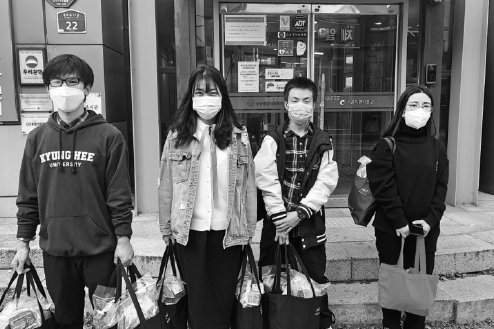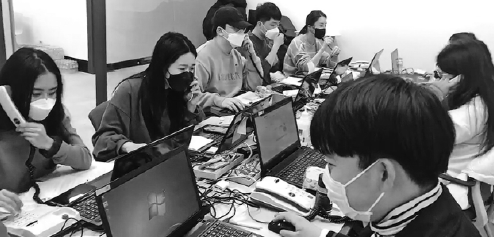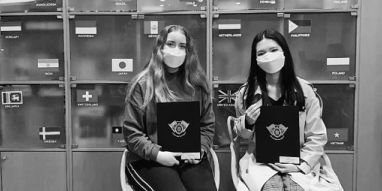Unsung heroes
Seoul organization recognizes those who helped fight COVID-19, including international students, Li Yingxue reports.

Stressful times can bring out the hero in people. Countries may be designated by borders but the human spirit does not require a passport to be stamped to help those in other countries. In South Korea, they are about to honor and show appreciation to those whose commitment to helping people was based not on medals or commendations but just a sense of common humanity.
The Seoul Volunteer Center will make a decision this month concerning 10 groups of volunteers who contributed to helping their local society during the COVID-19 pandemic. Of the 10 groups that were nominated, there is one group that is made up entirely of foreigners. They are the Dongdaemun international volunteer group, and their members are mostly overseas students from China. Although it has yet to be decided which group is the final winner-the announcement will be made sometime next month-it's already a great honor for these volunteer groups to be considered.
Li Hao, 25, founder of this volunteer group of foreigners, is a fresh graduate of Kyung Hee University in Seoul, South Korea. He comes from Chuzhou, in Anhui province. From Feb 24 to March 20, he organized 46 volunteers to help the university track the more than 4,000 international students. The information required centered on their relevant flight numbers and home-quarantine situations, to help with the local government's pandemic prevention work.
"In early February when COVID-19 hit China hardest, it was just before the new semester started in South Korea," Li recalls. "As many Chinese students were returning to universities in South Korea, there was heavy demand for the government to track their home-quarantine situation."
Li offered Dongdaemun District Government, where Kyung Hee University is based, to organize a group of Chinese student volunteers to help track the information of all the international students through phone calls.
The government agreed to the proposal and Kyung Hee University expressed its willingness and desire to cooperate with Li's team.
According to Chung Woo-seok, dean of the university's international office, around 80 percent of its international students are from China.
"The volunteers were divided into 10 groups and took shifts to call overseas students, checking their flight information, health condition and home-quarantine situation. Because there was no language barrier between the Chinese volunteers and the students, the information could be delivered precisely with more efficiency," Chung says.
Good call
Wang Weijian, 24, flew back to South Korea from his hometown of Qingdao, Shandong province, on Feb 1, to take his senior year studies in hotel management at Kyung Hee University.
When he saw on WeChat that Li was recruiting student volunteers to help collect information for overseas students, he signed up right away.
He took a four-hour shift on weekdays for four weeks, making about 200 phone calls during each shift.
"We had two lists of standard questions to ask students, one for those who had already come back to South Korea and one for those who had not yet returned," Wang says. "For those who returned to their hometowns, we needed to record when they were coming back and their flight schedules so we could coordinate with university staff to send a school bus to fetch them from the airport."
Wang recalls that, at first, there were students who didn't welcome the daily phone calls. "There was one student who always seemed to be asleep whenever we called him, and I felt a bit bad for waking him up all the time," he says.
"Due to the pandemic, the orientation was canceled this year, so the newly arrived overseas students had questions about many things, such as how to select their courses.
"Some of them were really anxious just after they arrived that they even cried during our phone calls," Wang adds. After the routine check, he patiently answered their questions. He even made a video demonstrating how to select courses online and shared it with the students.
In August, Wang flew back to his hometown and is taking online courses this semester. He is looking for volunteer opportunities in Qingdao.
"After doing this volunteer work, I realize that wherever I go, and whether it is for our own compatriots or not, we have a responsibility to our local society," Wang says.
In Li's volunteer team, as well as the 42 Chinese students who communicated to fellow students in Mandarin, there were also four students from the United States, Norway, Uzbekistan and Indonesia.
Chung thinks that the volunteers also harbored fears about the pandemic, and faced difficulties themselves, but they've played a key role in providing support to Chinese students. "I sincerely appreciate the help from all of the volunteers," Chung says. "The volunteer group's work is an example of international cooperation.
"During this pandemic, it's important to have mutual understanding and active collaboration based on mutual trust."
Yoo Deok-yeol, mayor of Dongdaemun District Government, says: "The volunteers' work didn't only serve Chinese students, but was also an example of a win-win for all sides, including Chinese students and the South Korean government. "He thinks that, in the future, the universities, the government and the international students should communicate more often to be better prepared for a crisis like this.
A voluntary bridge
Li enrolled in the University of Jinan in 2014 majoring in English. In his junior year, Li went to study at Pusan National University in South Korea as an exchange student. After a year's study, he transferred to Kyung Hee University to major in business administration for his bachelor's degree.
His first volunteer work in South Korea was to help translate the local subway routes to help Chinese tourists. In October 2017, when Li was volunteering at Seoul Global Center, he noticed that on one hand, college students want to have volunteer opportunities but lack efficient channels to get one, while on the other hand, institutions or organizations find it difficult to recruit volunteers. "I thought I could be the bridge to link both sides," Li says.
He then started a volunteer organization and shared the recruiting information. So far, there are around 500 registered members, most of whom are international students, but there are also South Korean students.
The Dongdaemun international volunteer group was initiated by Li for pandemic prevention. He says that, even though their work finished in March, the group will continue to do more volunteer work in the local community. In November he and his team have another mission-to help distribute food to local elderly people with mobility problems.
In June, he started a third volunteer organization collaborating with Korea University.
Besides his part-time job at Korea International Trade Association and preparation for his postgraduate studies, Li devotes the rest of his time and effort to the volunteer work. His next plan, he says, is to provide online Chinese-language courses to local senior high school students.



Today's Top News
- Xi congratulates Ouattara on re-election as president of Cote d'Ivoire
- Supercarrier to be put through paces
- Game changers for China's sports industry
- EU should not give platform to 'Taiwan independence' separatists
- Nation drives global energy transition
- Tariff-troubled US fears not-so-happy holidays






























